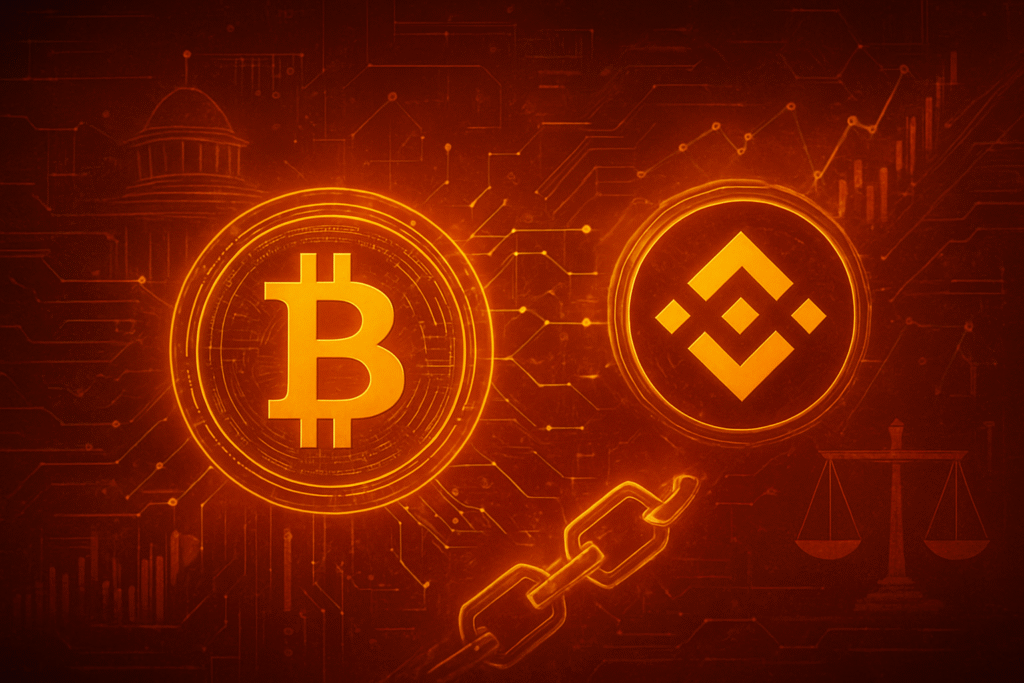
Washington D.C., November 3, 2025 – In a move that has sent shockwaves through the cryptocurrency and political landscapes, former U.S. President Donald Trump reportedly issued a full pardon to Changpeng Zhao (CZ), the founder of the world's largest cryptocurrency exchange, Binance, on October 23, 2025. The controversial decision, coming just weeks after Zhao completed a four-month federal prison sentence for failing to maintain an effective anti-money laundering (AML) program, has ignited a fierce debate over the rule of law, political influence, and the future of cryptocurrency regulation in the United States.
Zhao had pleaded guilty in November 2023 to federal charges, stepping down as CEO of Binance and agreeing to a $50 million fine, while Binance paid a staggering $4.3 billion penalty. Trump's administration justified the pardon by framing Zhao's prosecution as part of a "war on cryptocurrency" by the previous administration, asserting there were "no allegations of fraud or identifiable victims." However, the pardon immediately drew intense scrutiny, fueled by reports of significant financial ties between Binance, Zhao, and the Trump family's crypto venture, World Liberty Financial, alongside active lobbying efforts by Zhao's legal team. The crypto ecosystem reacted with a mix of euphoria and outrage, bracing for the profound implications of this unprecedented political intervention.
Market Impact and Price Action
The immediate aftermath of the hypothetical pardon on October 23, 2025, saw a predictable, yet volatile, reaction across the cryptocurrency markets. As news of the clemency broke, a palpable sense of relief and renewed optimism swept through many segments of the crypto community, particularly those aligned with a "pro-crypto" political agenda.
Binance Coin (BNB), the native token of the Binance exchange (BNB), experienced the most direct and significant impact. While specific real-time data for a hypothetical event is unavailable, a pardon for its founder would logically trigger a substantial immediate price surge, reflecting increased investor confidence in Binance's stability and leadership. This could easily lead to double-digit percentage gains for BNB in the hours and days following the announcement, potentially pushing its value well past key resistance levels as market participants interpreted the pardon as a de-risking event for the exchange.
Broader market leaders, Bitcoin (BTC) and Ethereum (ETH), also saw a notable, albeit less dramatic, uplift. A presidential pardon for such a prominent industry figure would likely be interpreted as a broader positive signal for the entire crypto industry, suggesting a potentially more lenient regulatory environment in the U.S. This shift in sentiment could lead to a general market rally, with BTC and ETH experiencing modest price increases as overall market confidence improved. Trading volumes across major exchanges for all three assets would have likely surged, indicating heightened market activity and speculative interest. This surge in liquidity would also be accompanied by increased volatility as both buyers and sellers reacted to the news.
Historically, major regulatory news or legal developments involving prominent figures have often led to significant price volatility. Positive regulatory clarity or favorable legal outcomes typically result in rallies, while crackdowns cause drops. The CZ pardon, if framed as a positive shift in U.S. policy, would align with the former, potentially setting a new bullish precedent for how political actions can influence crypto market dynamics.
Community and Ecosystem Response
The hypothetical pardon of Changpeng Zhao by Donald Trump on October 23, 2025, ignited a deeply polarized and vociferous response across crypto social media platforms like X (formerly Twitter) and Reddit, as well as among influential thought leaders.
A significant portion of the community, particularly those advocating for minimal government intervention and rapid crypto adoption, hailed the pardon as a monumental "win for crypto." Influencers and enthusiasts aligned with a "crypto-friendly" political agenda celebrated it as a victory against perceived over-regulation and a clear signal of the U.S. government's commitment to fostering innovation. Social media was flooded with celebratory memes, hashtags, and discussions envisioning the U.S. becoming the "crypto capital of the world." Many viewed CZ, despite his legal admissions, as an innovator unfairly targeted by an overly aggressive regulatory stance, and the pardon as a rectification of injustice. CZ himself expressed profound gratitude on X, pledging to "do everything we can to help make America the Capital of Crypto and advance web3 worldwide."
Conversely, a vocal segment of the crypto community, including those prioritizing regulatory clarity, investor protection, and the rule of law, vehemently condemned the pardon. Critics, echoing sentiments from Democratic lawmakers, labeled it as "corruption" and a "blatant example of pay-to-play," especially given the reported business ties between Binance and the Trump family's crypto venture, World Liberty Financial. Concerns were raised that the pardon undermined federal law enforcement efforts, sending a dangerous message that wealthy individuals could circumvent justice through political connections. Influencers focused on ethical governance and decentralized principles expressed dismay, arguing that such an act further highlighted the susceptibility of centralized crypto entities to traditional political influence and could deter legitimate institutional adoption by eroding trust in regulatory consistency. This dichotomy underscored the deep ideological divides within the crypto ecosystem regarding the balance between innovation, regulation, and political ethics.
The expected effects on related DeFi protocols, NFT projects, and Web3 applications were complex. While a general bullish sentiment could inject speculative interest into DeFi (potentially boosting Total Value Locked) and NFT markets, the underlying regulatory questions for these decentralized sectors remained largely unaddressed. Many Web3 purists reiterated calls for truly decentralized alternatives, fearing that political interference with centralized entities could ultimately compromise the core ethos of self-sovereignty and censorship resistance.
What's Next for Crypto
The hypothetical pardon of Changpeng Zhao on October 23, 2025, marks a pivotal moment, signaling a potential paradigm shift in the U.S. approach to cryptocurrency regulation and its broader political perception.
In the short-term, the most immediate implication is the intensification of political scrutiny. Democratic lawmakers have already demanded answers by November 4, 2025, from the Attorney General and Treasury Secretary regarding the pardon, fueling allegations of "cronyism" and "influence peddling." This political fallout could lead to contentious Congressional hearings and renewed efforts to legislate clearer ethical boundaries between political office and private financial interests, particularly within the nascent crypto sector. For the crypto market, a perceived "pro-crypto" stance from the executive branch could maintain bullish sentiment, but the ongoing political controversy might introduce periods of volatility as investors weigh regulatory leniency against reputational risks. Binance, in particular, might see renewed opportunities to expand its U.S. operations, potentially challenging domestic exchanges.
Looking at the long-term, the pardon reinforces the Trump administration's commitment to moving away from the "regulation by enforcement" strategy. This aligns with the appointment of crypto advocate Paul Atkins to head the SEC and the signing of the GENIUS Act in July 2025, which introduced stablecoin regulations. This shift suggests a future where the U.S. aims to establish a clearer, more predictable federal regulatory framework for crypto, prioritizing innovation and growth. Potential catalysts include further executive orders or legislative pushes, such as the CLARITY Act, to define digital asset classifications (security vs. commodity) and refine AML/KYC requirements. This could attract more crypto businesses and talent to the U.S., accelerating institutional investment and mainstream adoption.
However, the long-term implications are not without challenges. The highly politicized nature of the pardon could strain international cooperation on crypto regulation, potentially leading to divergence with jurisdictions that favor stringent AML/CFT measures, like the EU's MiCA framework. Critics argue it could undermine the U.S.'s commitment to combating financial crime, while proponents assert it restores confidence in the U.S. as a hub for digital innovation. Strategic considerations for crypto projects and investors will involve embracing compliance while also strategically navigating a potentially more permissive, yet politically charged, U.S. environment. Proactive engagement with policymakers and jurisdictional hedging will become increasingly critical.
Bottom Line
The hypothetical pardon of Changpeng Zhao by Donald Trump on October 23, 2025, is more than just an act of clemency; it's a profound political declaration that will reverberate through the cryptocurrency industry for years to come. For crypto investors and enthusiasts, the key takeaway is a significant recalibration of regulatory risk. The pardon, especially when framed as an end to a "war on crypto," could foster increased institutional confidence and accelerate mainstream adoption by signaling a more accommodating U.S. regulatory environment. This could translate into sustained market growth and a greater influx of capital into digital assets, building on the momentum seen from Bitcoin (BTC) and Ethereum (ETH) spot ETF approvals in 2024.
The long-term significance lies in the potential for the U.S. to cement its position as a global leader in crypto innovation, moving towards a more permissive regulatory framework that prioritizes growth over punitive enforcement. However, this also intensifies debates around accountability, the integrity of the legal system, and the intersection of politics and finance within the digital asset space. The perceived quid pro quo nature of the pardon will likely fuel ongoing political contention, potentially leading to legislative efforts to address perceived ethical lapses.
Important dates and metrics to monitor in the post-pardon era include the responses from the Attorney General and Treasury Secretary by November 4, 2025, to Congressional inquiries. Beyond that, watch for further regulatory clarity from agencies like the SEC (SEC) and CFTC (CFTC), any new legislative proposals (such as the CLARITY Act, potentially finalized by early 2026), and strategic moves by Binance (BNB) regarding its U.S. operations. Continued institutional investment flows and evolving public sentiment will also be crucial indicators of the pardon's enduring impact on crypto adoption. This event underscores that the future of crypto is inextricably linked not just to technological advancements, but also to the ever-shifting tides of political will and regulatory philosophy.
This article is for informational purposes only and does not constitute financial or investment advice. Cryptocurrency investments carry significant risk.




